|

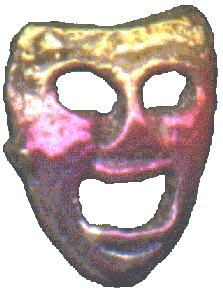




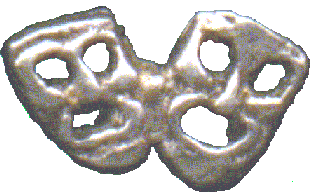
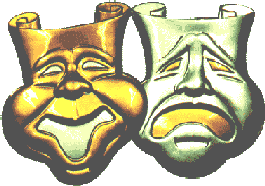



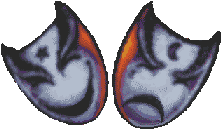




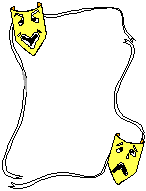












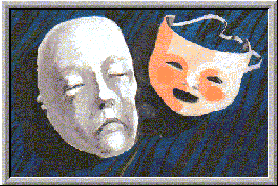









|
How can the laddie on whom I had set my heart be dead?
He can be dead like all the young soldiers before him.
Bring him a rose: he was beautiful.
|
This is the lad who was forced to be slave but who made himself free
by the force of his will. Line the roads, watch him pass
on the road to the grave: he was valiant.
This is the lad with the balance as true as a fine sword:
though he was not born to a warrior's form he'd a warrior soul
and he struck the true blow -
|
now the blow at the heart which has felled him at once, in the instant
in which the wheel turned for him, finally,
sundered the world - oh but I never dreamed
he bore his death in his breast like the seed in the flower.
Well but I never cared for his famous name -
for his fame, his wide name or his so-called shame - what I saw
was a true heart, a man
who had suffered indignity worse than the mind could encompass
and yet still had dignity; one who had felt
such cruelty in his own flesh that the mind shied away from it
yet who was kind; who had known
the cruel indignity posing as love which meant agony
yet who was loving; the crudest, most coarse degradation and yet was refined.
Both in body and mind he was torn, yet he seemed more alight
with what joys came his way, more alive
to the sorrows of others than any I'd seen: he who'd been shown
an absolute contempt viewed others with respect, attentiveness
and sympathy, who'd met such scorn.
Though he was born
bearing his death already as a thing accomplished he had such
accomplishments,
such gifts of art and character, was so much loved,
with such a fortunate and favoured nature that his brief life should,
if fortune had been merciful, have been
a brilliant spring that ended in the blossom
that would not flower into a shining summer - should have been
however short
perfect, complete and rounded sweetly as he was himself; he should have been
fair fortune's mayfly darling, as he was mine: not to have had to bear
and bear forever violation and assault
in one form or another; not to have had to hear
and hear forever how men watched and cheered
to see his agony of pain and shame and how they jeered him,
pitiless,
hearing him scream for mercy (it was ever this way:
Armstrong  learned it; learned it;
that to ask grace at a graceless face
could never profit). Yet he'd more care for a man
he'd never met than ever for himself, minding a stranger's sickness
more than his own: there was in him
mercy and pity wide enough for every wound.
He well had known
betrayal more bitter than death yet still was trusting, warm - had felt such fear
it seared like cold fire, like a brand
on the mind, on the soul; yet he faced it and won.
Despite his long humiliation, still
he had the victory
and died as he had lived - despite all agony
still mocking-merry.
|
This is the lad who was half of his life
in the hands of destroyers, yet was not destroyed - who was broken
and yet still died whole
by the strength of his soul: clear the streets, watch him pass, he was strong;
|
also steadfast, steady: he could be
vain, waspish, rowdy, maddeningly vague but always sensible
and sane, and gentle, with the moonshine gift
of laughter like a silver fish
flashing beneath the surface of his speech.
There were times I knew of that he raved
and wept, drowning in darkness; days
and nights when memory
heaving beneath him like a gale-caught ship, like sickness,
surging beneath the surface of his mind
raged without rest - it seemed to me
through the madness of pain he was sane
as any man living, was laughing
and fine and I saw him,
his laughter, his spirit, a light
that was stronger than night,
than the darkness he'd known - he had style
and substance.
|
This is the lad who has given the lie to the old truth
that those to whom evil is done will do evil
in turn, who bore horror
with humour and made the world smile. Clear the roads, mark him pass
on his road to the grave - he had style.
|
He feared himself despised, but he was loved
more and more truly than most born have ever been,
before or since, and when he died
the people lined the streets, as for a prince -
speaking their sorrow in the broader tongue, as he did. He was many things
in life, but before all his fame, beneath
all suffering, he was a local lad who liked a drink,
a lark, on level terms
with everyone he'd meet:
out of Lanarkshire came forth something sweet.
Well and I never met a mind that I liked better
or admired more, or had a friend
more dear to me or company
more easy or more pleasant, more engaging,
antic, sweet, old-fashioned,
quirky, individual
or warm in sympathy, or witty, wise,
self-mocking, boundlessly alive, or knew a soul
more open or more true.
I always knew
from the dawn of time to the end of time the wheel turns,
the young men die
and the ladies go dancing at Whitsun  : :
all the young soldiers will never grow old
and the golden lads all come to dust . .
First the horse and then the rider: having been left no sureness
in his own self, the mettle of the man
was set in metal, mocking the world -
"the midget with the Merc". The vandal's urge
is ever to deface
anything fine, whether by rape or broader
violence: the vehicle
of vanity being wrecked
in overt threat
from those who'd smashed his fiery, fragile pride,
the driver likewise soon laid down and died.
|
This is the lad who was dragged in the dust but whose soul was as clean
as a clear spring - a spirit like flame, dancing, gallant,
the bravest and best.
|
He was as near to sinless as a grown man well could be
though he was punished endlessly
in one sense or another
for the sins of others: he would step
onto the stage to spin a magic
out of laughter even with ribs broken
and return
home perhaps to be beaten, tortured, raped - return
to make his magic out of laughter even with heart broken;
even with mind broken: though he got blame
and persecution when the thing was spoken
rather than thanks. And he would step
onto some stage to tell the story
of the horror he'd endured although the memory
of memory was near enough
to kill him - but he feared far more
that which was done to him still being done
to others than to see his suffering
made flesh
face him across a courtroom: though the stone of pain
and blood within the breast struck him from life
before the final scene,
he was a trouper and had honour - honour him.
|
This is the lad who was weakest in body but strongest in soul,
who knew torture, knew terror, but faced down his fear
to save others, whose courage was high:
line the streets, watch him pass: he was gallant.
This is the lad who has struck the true blow to save others
from suffering as he had. The sword of his soul
is cast down - take it up, take the colour and go where he led:
line the roads, mark him pass and remember him
bedded in flowers - he was beautiful,
the best, the most dear
he has earned his true bier and his pyre
let him lie in the fire
and go with the brave wind that bears up the soldier
to rest on the hill.
Let Scotland's honoured dead receive him
and be honoured to do so
|
And may all of the rest of my life be a letter to you.
|
Claire Jordan 21.8.96-20.9.1996
(minor modifications spring '98, New Year & spring '99)
To the memory of Eric Robertson Cullen, 12 th July 1965 - 16th August 1996 |
Go to Poetry Menu
Go to Main Menu
|



























|

